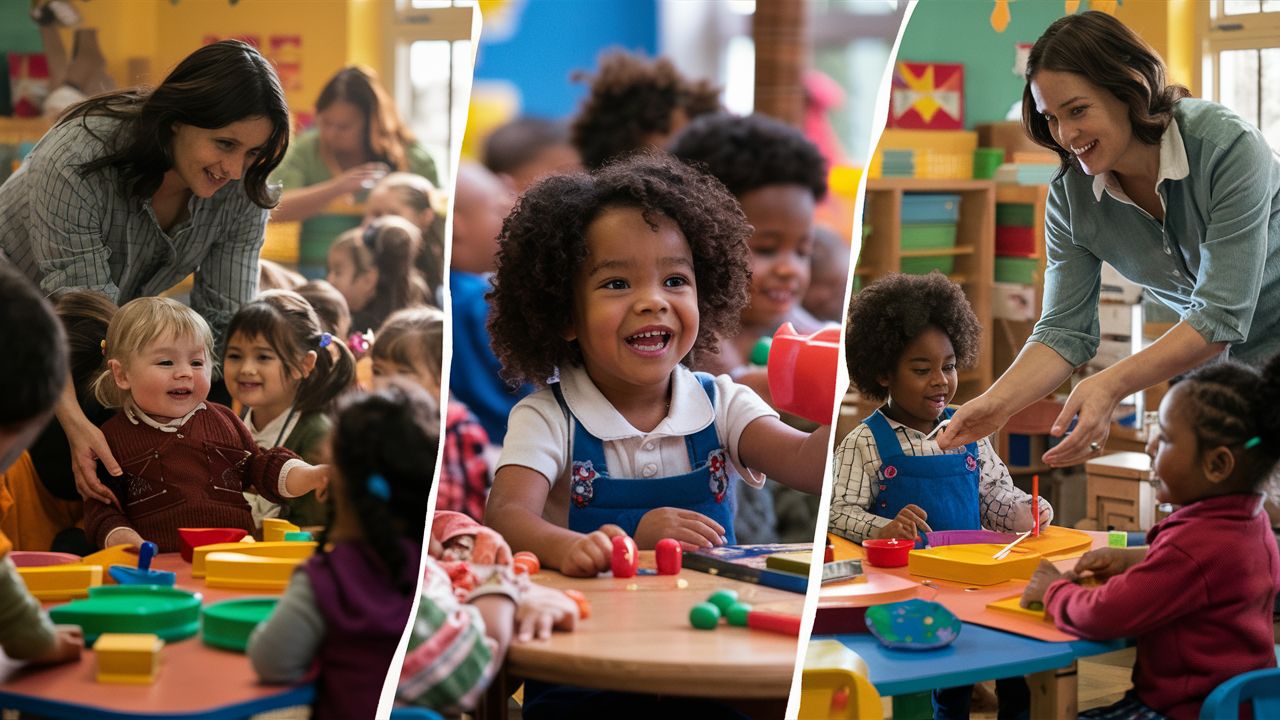Here at Early Childhood Education 2024,educators, parents, and caregivers can find a wealth of useful information and practical tips for fostering the development of the youngest brains. We cover a wide range of topics in early childhood education in this guide.
Come along as we delve into the complex world of early childhood education, equipping you with the knowledge and skills necessary to make wise choices and establish safe, supportive spaces that allow kids to develop their minds, bodies, and souls. Let’s go out on a journey together to help our youngest students reach their greatest potential.
What is Early Childhood Education?
It simply is the word used officially to describe training young children. More precisely, it refers to structured and unstructured educational initiatives that support kids’ development and growth during their preschool years (birth to age five).
During these years, children are totally dependent on the adult caregivers in their lives, such as parents, teachers, babysitters, daycare providers, and extended family members.
The main focus is to develop crucial concepts, abilities, and developmental milestones that kids reach at this age, including social-emotional development, reading, numeracy, and critical thinking.
Why Is Early Childhood Education Important?
This education offers several long-term benefits for children. Studies, such as one by Harvard, have shown how early childhood education programs help equip children to develop the social and emotional skills they need to succeed and finish high school.
Gaining better grades and developing a lifelong love of reading and learning are two other advantages of ECE. Studies have also indicated that children who attend high-quality ECE programs as children can develop an increased attention span which can lead to more productivity in their later employment.
Also see more about Education In Usa
Types of Early Childhood Education Programs
The four major categories of learning styles are as follows:
Child care centers
Kindergarten through sixth grade children are cared for by school-age care programs. These may be provided in an establishment such as a school, YMCA/YWCA, parks and recreation program, or community center.
Waldorf
The Waldorf preschool curriculum emphasizes intellectual exploration and combines structure and spontaneous learning. Mixed-age classrooms are common, and play-based learning is the main teaching method.
Montessori
The Montessori method is a kid-focused curriculum that views educators as mentors for learning. Children in mixed-age classrooms study at their own pace. The practical life, sensorial, mathematical, language, and cultural studies are the five main study areas that this approach offers.
Cooperative parents
Families and parents can participate directly and actively in their child’s education through a parent cooperative preschool program. When parents who share similar values band together to select educators who best suit their kids’ learning styles, cooperative preschools are born.
Bank Street
A non-traditional program with an emphasis on the social sciences is the Bank Street approach. With this active, imaginative learning approach, kids can pick up knowledge from their surroundings.
The Benefits of Early Childhood Education
The Social Skills Are Improved
Programs for early childhood education aid in children’s social skill development. Children are exposed to children and adults outside of their homes, instead of spending the entire day at home.
Early Childhood Education and Higher Life Success are Associated
Children that participate in the program have a higher chance of succeeding as adults and teenagers.
Early Childhood Education Frees Up Parents’ Time for Work and Study
The independence it offers parents is one of its main advantages. It is quite difficult for parents to find full-time employment or go to school without daycare.
The idea of collaboration
Acquiring the skills of sharing, teamwork, patience, and perseverance in a secure classroom under the direction of educators who have the kids’ best interests in mind.
Passion for Ongoing Education
Children should be encouraged to learn effectively by having fun and engaging in engaging lessons. We must eagerly and enthusiastically arouse a passion for knowledge.
Respect
Instilling in others the importance of respect. Respect for their immediate and global surroundings can also be interpreted as extending beyond individuals and their possessions.
How to Become an Early Childhood Educator
- Participate in a program for early childhood education.
- Get experience by volunteering or doing student teaching.
- Obtain a Bachelor of Science in Early Education degree or an Associates degree.
- Obtain your teaching credentials as a Child Development Associate (CDA).
- Early childhood educators set the example for their kids by modeling positive and successful behaviors in the classroom.
- In the classroom, demonstrating your enthusiasm for your pupils’ interests will pay off big time. Your genuine interest in what makes a child happy validates them.
What is the Requirement
A high school degree plus an early childhood education certificate or associate degree are the basic prerequisites. Coursework in child growth and development, early childhood curriculum planning, children with special needs, family and community involvement, and psychology are included in these programs, which often take one to two years to finish.
FAQ
What is early childhood?
Developmental milestones include actions like waving “bye-bye,” taking one’s first step, and smiling. Youngsters experience developmental milestones in their play, learning, speech, behavior, and movement (such as when they crawl and walk).
What is the role of an early childhood teacher?
Offers an engaging, secure, and developmentally suitable learning environment.
Conclusion
As we draw to a close “The Ultimate Guide: Early Childhood Education 2024,” we consider how crucially important a child’s early years are in determining their life’s course.
We have covered a wide range of subjects in this guide, from the fundamentals of early learning to the most recent advancements in pedagogy and practice. May your enthusiasm, devotion, and unrelenting commitment to inspiring and empowering the next generation never stop. We can create a better future for all kids if we work together.
